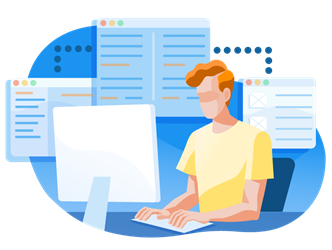Common reasons you could face a software development lawsuit
Antitrust lawsuits may be exclusive to big tech, but there’s no shortage of lawsuits for small companies as well. Learn the reasons behind most software developer lawsuits – plus ways to soften their impact and even avoid them.
6 reasons software developers get sued
Software developers are most vulnerable to litigation when their mistake causes someone else to lose money. Usually that’s a client. But competing companies, end users, or even your employees can also pin the blame on your company when something goes wrong.
Here are six common causes of software development lawsuits.
1. Security and privacy issues
As Zoom learned during the pandemic, consumers – and the Federal Trade Commission (FTC) – are less than thrilled when private information isn’t kept private. Whether it’s someone gate-crashing your Zoom meeting or a data breach that exposes credit card numbers, many situations are ripe for lawsuits.
Zoom had to reach a settlement with the FTC because of allegations tied to misleading security practices. But an honest mistake can lead to a security breach too.
On top of that, if a hacker exposes client data stored in your cloud server or protected by your software, prepare to take the blame. You’re likely to end up in court if money had to be spent to resolve the issue.
2. Mistakes and oversights
Even a few hours of downtime can have a big impact if a client depends on your software to run their business. If a mistake causes your service to crash or go offline, prepare for clients to level a software development lawsuit.
As an example, the collaborative platform Slack was recently sued over downtime after failing to live up to claims they could provide uninterrupted service 99.99% of the time.
Your clients are entitled to reasonable care, which means meeting the standards expected in your industry. That includes checking your code for errors and making sure your software performs as expected.
3. Miscommunication
As a software developer, your clients might not have the technical know-how that you do. You might make assumptions about what they know, or fail to explain the limitations of a software product or service.
For instance, Nvidia was recently sued over how much memory was on a video card due to a miscommunication with its own marketing department that led to confusing customer-facing communications.
Remote work leaves more room for misinterpretation. If someone reads your message or even interprets your emoji the wrong way, the result could be a lawsuit, even if you didn’t do anything wrong.
4. Breach of contract
No one sets out to break a contract. But an emergency or illness could cause you to miss a deadline, or a misunderstanding could cause you to deliver software that doesn’t meet your client’s expectations.
For example, Accenture was sued for $32 million for failing to deliver a website and apps to car rental company Hertz after multiple delays.
Software developers can also face a breach of contract claim over a non-compete clause. Read the terms of your agreement carefully before switching to a new employer.

The term “contract negligence” covers breach of contract and professional negligence, two related but different legal issues. Both of these can lead to lawsuits for tech companies.
5. Discrimination
It’s not only big tech that gets sued over sexism and ageism. If someone thinks you made an unfair decision related to hiring or firing, the result could be a lawsuit.
Examples are easy to find in the software industry. Uber has been hit with accusations of sexual harassment. Other companies face accusations of discrimination based on race or even age.
6. Trademark or copyright infringement
Have you ever copied and pasted code you found online? Or does your iOS or Android app include graphics, music, or video clips? Then you might be vulnerable to a trademark or copyright infringement lawsuit. Even a similarity could get you sued if the owner sees a trademark or copyright connection.
Intellectual property rights are a concern, too. For example, Redfin and its co-founder David Eraker are in a dispute over who owns 3D home tour technology. From your company logo down to your code, software developers need to be extremely mindful of using content they don’t own.
How can software developers reduce the risk of lawsuits?
Litigious clients don’t come with a warning label. But you can still take steps to reduce the odds of being sued.
Here are a few ways to reduce your risks and mitigate financial damage.
Form an LLC or a corporation
In every state, it’s easy to turn a sole proprietorship into a limited liability company (LLC). This separates your personal finances from your business assets, so if you’re sued you can protect your personal wealth.
Incorporating provides the same protection. Your business can still be sued, but your personal assets will stay safe no matter the outcome.
Learn more about choosing a legal structure for your business.
Be clear in your contracts and communication
Good communication is essential, especially with first-time clients. To avoid disputes and potential lawsuits, make sure your contracts and software license agreements are detailed and accurate. They should describe your expectations, liability, contingencies, deadlines, and anything else that could impact a project.
If an issue arises, don’t hesitate to tell your clients. Keep them updated so they’re not surprised when there’s a delay. Be clear that costs and timelines will change if requirements change for software development projects.
Perhaps most important, capture every communication in writing. Send out a brief email to summarize any phone conversations. If you use chat and collaboration tools, make sure you can go back and access past messages.

The scope of almost any software development project is bound to change over the course of implementation. How you manage this inevitable "project scope creep" can mean the difference between success and failure.
Follow software engineering best practices
Best practices aren’t just for big companies. They help small software companies avoid mistakes and steer clear of lawsuits too. Here are a few examples:
- Choose one coding standard with your team and stick to it
- Put code through peer review
- Use automated testing to check for errors
- Explore other resources and continuous learning to keep your company up to speed
Protect your business with insurance
You can reduce your risk, but you can’t eliminate it entirely. That’s why commercial insurance is so important. When you’re sued, insurance helps pay legal costs that could otherwise harm, or potentially collapse, your company.
These policies defend against the most common software development litigation.
- Errors and omissions insurance (E&O) covers legal costs if a client accuses your company of a mistake, oversight, missed deadline, or substandard work. It's also called professional liability insurance.
- Cyber liability insurance pays costs related to data breaches and cyberattacks. That includes notifying affected clients and defending against lawsuits over a breach.
- Commercial general liability insurance covers common third-party claims, including personal injury, intellectual property infringement, and property damage.
- Employment practices liability insurance (EPLI) protects you when you’re sued over an employment decision like hiring, firing, or promotion.
These are the basics, but commercial insurance is filled with nuance. For example, software developers usually opt for technology errors and omissions insurance (tech E&O), which includes both cyber liability and E&O coverage. And remember that your insurance company won’t protect you if you break the law or do intentional harm.
Talk with an insurance agent to find the best policies for your business’s unique risks.

Even the most skilled software developers aren't immune to risk. Insurance can help pay for client lawsuits, cyberattacks and data breaches, medical expenses from accidents, and other bills that could sink your business.
